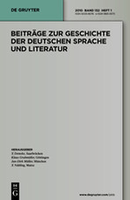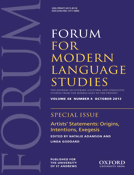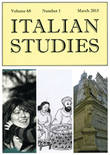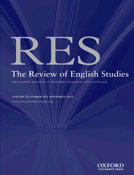
Moenia-Revista Lucense de Linguistica & Literatura
Scope & Guideline
Cultivating a Platform for Transformative Academic Discourse
Introduction
Aims and Scopes
- Literary Analysis and Critique:
The journal publishes critical appraisals of literary works, exploring themes such as characterization, narrative techniques, and authorial intent, often through the lens of historical and cultural contexts. - Intermediality and Representation:
There is a consistent focus on the interplay between different media forms in literature, including visual arts and performance, examining how these interactions influence literary expression and understanding. - Linguistic Studies:
Research articles explore various aspects of linguistics, such as diachronic studies, syntactic and semantic analysis, and the evolution of language within specific cultural and historical frameworks. - Cultural and Historical Contexts:
The journal emphasizes the importance of cultural history in understanding literature and language, highlighting the socio-political influences on literary movements and linguistic developments. - Portraiture and Identity in Literature:
A significant theme involves the study of portraits and self-portraits in literature, examining how identity is constructed and represented through literary forms.
Trending and Emerging
- Interdisciplinary Approaches:
There is a notable trend towards interdisciplinary studies that combine literature with visual arts, media studies, and cultural history, reflecting an increased interest in how different forms of expression intersect. - Identity and Representation:
An emerging theme is the exploration of identity, including self-representation and cultural identity in literary works, particularly in the context of global and local narratives. - Contemporary Literary Criticism:
Recent publications indicate a shift towards contemporary literary criticism, examining modern authors and their works in light of current social issues, reflecting the journal's responsiveness to contemporary discourse. - Sociolinguistics and Language Variation:
There is an increasing focus on sociolinguistic studies that analyze language use in various social contexts, highlighting issues of identity, power, and community within linguistic practices. - Digital Humanities:
The integration of digital tools and methodologies in literary and linguistic research is emerging as a significant trend, showcasing innovative approaches to text analysis and interpretation.
Declining or Waning
- Traditional Linguistic Theories:
There seems to be a waning interest in discussing classical linguistic theories, as newer and more dynamic approaches to language analysis gain traction, reflecting contemporary linguistic trends. - Historical Linguistics:
Research concerning purely historical linguistics, particularly diachronic studies unrelated to contemporary applications or relevance, appears to be less frequent, suggesting a shift towards more applied linguistic studies. - Narrowly Defined Literary Genres:
The investigation of specific literary genres in isolation is declining, as scholars increasingly prefer interdisciplinary and cross-genre studies that reflect the complexities of modern literature.
Similar Journals

Archivum
Unlocking Knowledge in Language and Literary TheoryArchivum, published by UNIV OVIEDO in Spain, stands as a vital resource in the fields of Linguistics and Language as well as Literature and Literary Theory. With an impact factor reflective of its commitment to scholarly excellence, this journal has proudly maintained an Open Access model since 1951, ensuring that its rich repository of knowledge is freely available to researchers, professionals, and students alike. Covering a converged span from 2019 to 2023, Archivum has strategically positioned itself within the academic milieu, currently categorized in the Q4 for Linguistics and Language and Q3 for Literature and Literary Theory as of 2023. The journal is indexed in Scopus, with rankings that reflect its growing influence, such as #690 in Literature and Literary Theory and #887 in Language and Linguistics. Despite its challenges in visibility, Archivum remains essential for those seeking to engage with contemporary discussions and research within the humanities. Located in the heart of Asturias, it embodies the scholarly spirit of Spain, fostering a collaborative environment for innovation and inquiry in linguistic and literary studies.

Vestnik Sankt-Peterburgskogo Universiteta-Yazyk i Literatura
Pioneering Research in the Heart of Linguistics and LiteratureVestnik Sankt-Peterburgskogo Universiteta-Yazyk i Literatura, published by ST PETERSBURG UNIV PRESS, stands as a pivotal academic journal in the fields of linguistics and literature, reflecting a profound commitment to the exploration of language and literary theory. With an ISSN of 2541-9358, this journal has steadily built its reputation since its inception in 2017, achieving impressive rankings in Scopus that place it within the top tiers of its categories—Q2 in Linguistics and Language and Q1 in Literature and Literary Theory as of 2023. The journal serves as an essential platform for researchers, professionals, and students who are keen to delve into the complex interactions between language and literature. Although currently not offering Open Access, its contributions are invaluable to advancing scholarly dialogue and fostering understanding within these vibrant fields. With a converged publication timeline extending through 2024, Vestnik Sankt-Peterburgskogo Universiteta-Yazyk i Literatura exemplifies the ongoing commitment to high-quality research and critical thought, making it an indispensable resource for those dedicated to the study of language and its literary manifestations.

Baltic Journal of English Language Literature and Culture
Illuminating the Rich Tapestry of Baltic English StudiesBaltic Journal of English Language Literature and Culture is a prominent platform for scholarly discourse in the fields of English language, literature, and cultural studies, published by University of Latvia Press since its inception. With an ISSN of 1691-9971 and an e-ISSN of 2501-0395, the journal has established itself as an Open Access resource since 2018, making it accessible to a global audience of researchers, academicians, and students. Located in Riga, Latvia, this journal endeavors to bridge gaps in the understanding of linguistic and literary developments, particularly in the Baltic region. Although it faces competitive ranking in the Scopus database, underscored by its current rankings of #1055 in Literature and Literary Theory and #1063 in Language and Linguistics, the journal continues to attract contributions that reflect innovative research and inquiry. Through its open-access model, Baltic Journal of English Language Literature and Culture is dedicated to fostering a diverse range of perspectives and nurturing dialogue that enriches the understanding of the English language’s intersection with culture and literature.

Sibirskii Filologicheskii Zhurnal
Illuminating the Depths of Language and Literary TheorySibirskii Filologicheskii Zhurnal is a prestigious academic journal published by the Russian Academy of Sciences, Institute of Cytology and Genetics. With ISSN 1813-7083, it is dedicated to advancing research in the fields of Cultural Studies, Linguistics and Language, and Literature and Literary Theory, and has achieved notable rankings, including Q2 in Cultural Studies and Linguistics, and Q1 in Literature for 2023. The journal provides a platform for scholarly discourse, contributing valuable insights to its fields with an evolving scope that spans from 2018 to 2024. Though not an open-access journal, Sibirskii Filologicheskii Zhurnal serves as a vital resource for researchers, professionals, and students in the Russian Federation and beyond, fostering a deeper understanding of linguistic and literary phenomena. Its commitment to high-quality content makes it an essential addition to any academic's library.

BEITRAGE ZUR GESCHICHTE DER DEUTSCHEN SPRACHE UND LITERATUR
Advancing Scholarly Discourse in Germanic StudiesBEITRAGE ZUR GESCHICHTE DER DEUTSCHEN SPRACHE UND LITERATUR is a distinguished scholarly journal published by Walter de Gruyter GmbH, focusing on the historical development of the German language and literature. With an ISSN of 0005-8076 and an E-ISSN of 1865-9373, this journal has been a pivotal resource for linguistic and literary scholars since its inception in 1874. Hailing from Germany, it serves as a critical platform for understanding the nuanced evolution of Germanic studies, contributing to its categorization in the Q4 and Q3 quartiles in Linguistics and Language and Literature and Literary Theory, respectively, as of 2023. Although not open access, the journal provides invaluable peer-reviewed content that fosters scholarly dialogue and research in its specialized fields, making it an essential read for researchers, professionals, and students dedicated to the richness of German linguistic heritage and literary analysis. The journal's extensive history and commitment to academic excellence position it as a key player in the ongoing discourse within the humanities.

FORUM FOR MODERN LANGUAGE STUDIES
Illuminating the Landscape of Literary TheoryFORUM FOR MODERN LANGUAGE STUDIES is a prestigious academic journal published by Oxford University Press that has been serving the fields of literature and linguistics since its inception in 1965. This journal, with an ISSN of 0015-8518 and an E-ISSN of 1471-6860, plays a crucial role in advancing scholarly discourse on modern language studies, including literature and literary theory. With an impactful presence in both the linguistic and literary domains, it has been recognized in 2023 with a category ranking of Q2 in Literature and Literary Theory and Q3 in Linguistics and Language. It stands out in the competitive landscape, holding a notable position within Scopus rankings, including a 70th percentile ranking in Literature & Literary Theory. While the journal currently does not offer open access options, it remains a vital resource for researchers, educators, and students passionate about the transformative power of language and literature. Its commitment to quality research and robust academic discussion underscores its importance, making it a key platform for those aiming to contribute to modern language scholarship.

Etudes Romanes de Brno
Advancing Scholarly Discourse in the HumanitiesEtudes Romanes de Brno, published by Masaryk University, Faculty of Arts, is a distinguished academic journal that has been contributing to the fields of Linguistics and Language as well as Literature and Literary Theory since its inception. With an ISSN of 1803-7399 and E-ISSN 2336-4416, this open-access journal has been a valuable resource for scholars since 2009, enhancing accessibility to a broad audience of researchers and students in the Czech Republic and beyond. The journal's impact is underscored by its categorization in the Q2 and Q3 quartiles for literature and linguistic studies as of 2023, reflecting its commitment to rigorous academic discourse. With Scopus rankings placing it in the 57th and 31st percentiles for its respective fields, it continues to attract high-quality submissions that explore contemporary issues in literary studies and language analysis. Etudes Romanes de Brno promises to remain an essential platform for the exchange of scholarly ideas, fostering growth and innovation in the humanities.

BULLETIN HISPANIQUE
Charting New Territories in Hispanic StudiesBULLETIN HISPANIQUE, published by PRESSES UNIV BORDEAUX, is a prominent academic journal dedicated to the interdisciplinary exploration of literature, linguistic studies, and historical analysis related to the Spanish-speaking world. Since its inception in 1972, the journal has established itself as a vital resource for researchers and scholars, achieving notable recognition across various categories—most recently characterized as Q2 in History, Q3 in Linguistics and Language, and Q1 in Literature and Literary Theory for the year 2023. Though it operates under traditional access models, BULLETIN HISPANIQUE maintains a commitment to scholarly excellence, offering insightful articles that contribute to the rich tapestry of cultural and linguistic discourse. With its Scopus rankings reflecting significant academic engagement, the journal serves as an essential platform for dialogue and discovery in the arts and humanities, appealing to a diverse audience of students, professionals, and academics committed to advancing knowledge in these vital fields.

Italian Studies
Uniting Perspectives on History, Language, and the ArtsItalian Studies, published by Routledge Journals, Taylor & Francis Ltd, stands as a distinguished academic platform in the fields of Cultural Studies, History, Linguistics, Language, Literature, and the Visual Arts. Established in 1937, this journal has fostered scholarly dialogue and innovation through its robust contributions and in-depth analyses that bridge historical and contemporary perspectives on Italian culture. With an impressive ranking in Q2 and Q3 quartiles across multiple categories, including Literature and Literary Theory, and a current impact factor reflecting its growing influence, Italian Studies serves as an essential resource for researchers, professionals, and students alike. Although not an open-access journal, it remains accessible via institutional subscriptions, ensuring that a wide audience can engage with its critically acclaimed research and articles. Located in the UK, Italian Studies continues to advance the understanding of Italy's rich cultural heritage, making it a vital cornerstone for those invested in the humanities and social sciences.

REVIEW OF ENGLISH STUDIES
Cultivating Scholarly Discourse in English StudiesREVIEW OF ENGLISH STUDIES, published by Oxford University Press, is a prestigious journal that has been advancing the fields of Literature and Literary Theory as well as Linguistics and Language since its inception in 1925. With an impressive impact factor and a commendable ranking, placing it in the Q1 and Q2 categories across relevant disciplines, the journal serves as a vital platform for researchers, scholars, and students alike. Covering a wide range of topics from classical literature to contemporary linguistic analysis, REVIEW OF ENGLISH STUDIES is committed to fostering scholarly discourse and promoting innovative research methodologies. Although it does not offer open access, the journal is highly regarded for its rigorous peer-review process and high-quality publications, making it an essential resource for anyone engaged in English studies. For researchers seeking to keep abreast of the latest developments in the field, this journal stands as an indispensable guide and repository of knowledge.